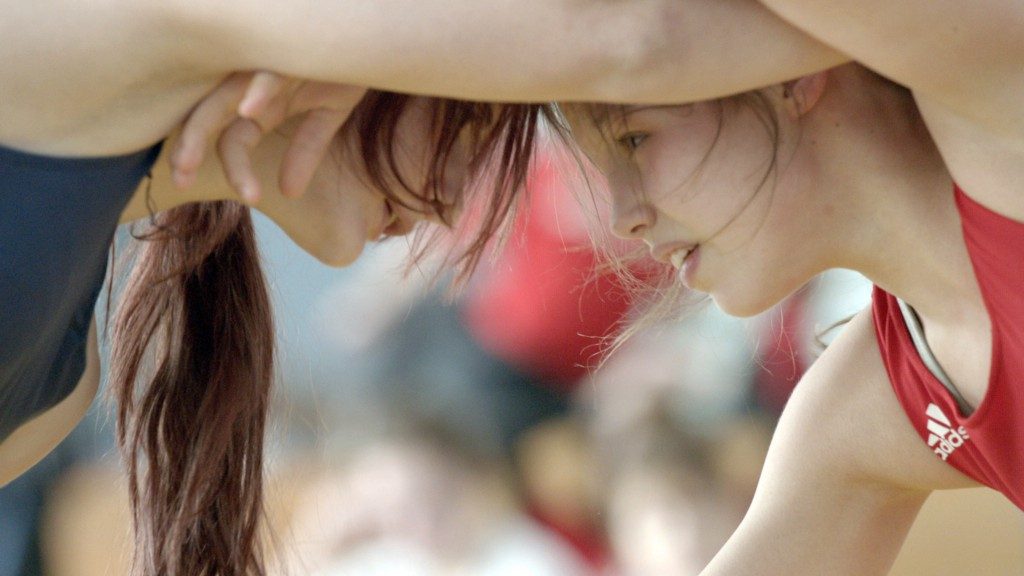Anna Koch studied directing at the German Film & Television Academy Berlin (dffb). Her short film credits include “Sisters” and “Fata Morgana.” “Win by Fall” is her first feature documentary.
“Win by Fall” will premiere at the 2017 SXSW Film Festival on March 12.
W&H: Describe the film for us in your own words.
AK: “Win by Fall” follows four teenage wrestlers — Janny, Debby, Lisa, and Michelle — from the moment they leave home at the age of 12 over a period of four years. They enter an elite sports school, a world of strict rules and discipline, in which they each struggle to find their place.
Wrestling becomes a metaphor for every girls path through this important time of their lives.
W&H: What drew you to this story?
AK: Wrestling, especially female wrestling, is not very well known in Germany. When I coincidentally stumbled upon it, it fascinated me right away. The n encounter of two bodies, gentle and violent at the same time, is almost like an ancient dance. It’s the mankind’s oldest sport with the modern twist of girls performing it with the same vigor and brutality as grown men.
W&H: What do you want people to think about when they are leaving the theater?
AK: I want them to think about passion. About fighting for something that seems out of reach. About giving it all even though you feel like giving up. About loss. And the rare moments of bliss when everything just falls into place.
W&H: What was the biggest challenge in making the film?
AK: The biggest challenge was to keep believing it was worth going on. The whole process from idea to finished movie took us about six years — a very long time for a tiny crew and limited budget and many, many days on set and the editing room.
After a while we realized the girls’ struggle resembled our own, and we had to get ourselves together to we could focus and get back on the mat. That moment made all the difference.
W&H: How did you get your film funded? Share some insights into how you got the film made.
AK: At first we were an ordinary film school project with next to no budget but technical support from our school. After a while we realized that if we wanted to get anywhere with it we needed partners from the outside to keep going. A regional TV channel got interested in the project and we got part of the Leuchtstoff funding, a special funding for graduating film school projects.
We teamed up with our production company, Anna Wendt Filmproduktion, the Rundfunk Berlin-Brandenburg (RBB), and the Medienboard Berlin-Brandenburg (MBB) and were able to finance the last two and a half years of production.
W&H: What does it mean for you to have your film play at SXSW?
AK: When we got the invitation we all were super excited. It is an amazing opportunity and an honor to be playing along so many great films! We could have not dreamed up a better place to celebrate our North American premiere.
W&H: What’s the best and worst advice you’ve received?
AK: The worst advice would have been to keep on working with people who I thought weren’t for the project. It is not a matter of skill or talent, but about chemistry. In the future if I don’t feel like a collaboration is helping the film become its best then I will not keep on pushing it but let go and find another way. The time that detour of finding someone right for the job takes is worth it.
The best advice would have been to clean my workspace from emotional drama. All it does is soak up everybody’s energy that originally should have flown right into the creative process.
W&H: What advice do you have for other female directors?
AK: Most of the time we were an all-female crew. And on top of that either pregnant or breast-feeding our babies. Five babies were born through the process of finishing this film. Babies on set, babies in the editing room, etc.
For us it was important to find a way to have everything flow together — a career in film and a family. Of course this was not always easy. A working mom is still not as well accepted as a working dad. But it is important to do it anyways and show others that it is actually possible.
W&H: Name your favorite woman-directed film and why.
AK: Oh, that’s a hard one. On the one hand there are still so few and on the other hand so many good ones to choose from! I guess it would be “The Gleaners and I” by Agnes Varda, because of its lightness, depth, and universal quality of her of Varda’s work. She brings humor and kindness to every situation. That, for me, makes her work very special.
W&H: There have been significant conversations over the last couple of years about increasing the amount of opportunities for women directors yet the numbers have not increased. Are you optimistic about the possibilities for change? Share any thoughts you might have on this topic.
AK: I am an optimist and positive about the world’s ability to change for the better. I think many of the important questions and issues are on the table and are being discussed which is the first big and important step.
Women with influence speak out about inequality and abuse. Now we, as the people involved, have to do our share and act to make change happen. It is not so much about dwelling in it theoretically but getting active about it — go out, shoot a movie, and fight for it to be seen.






